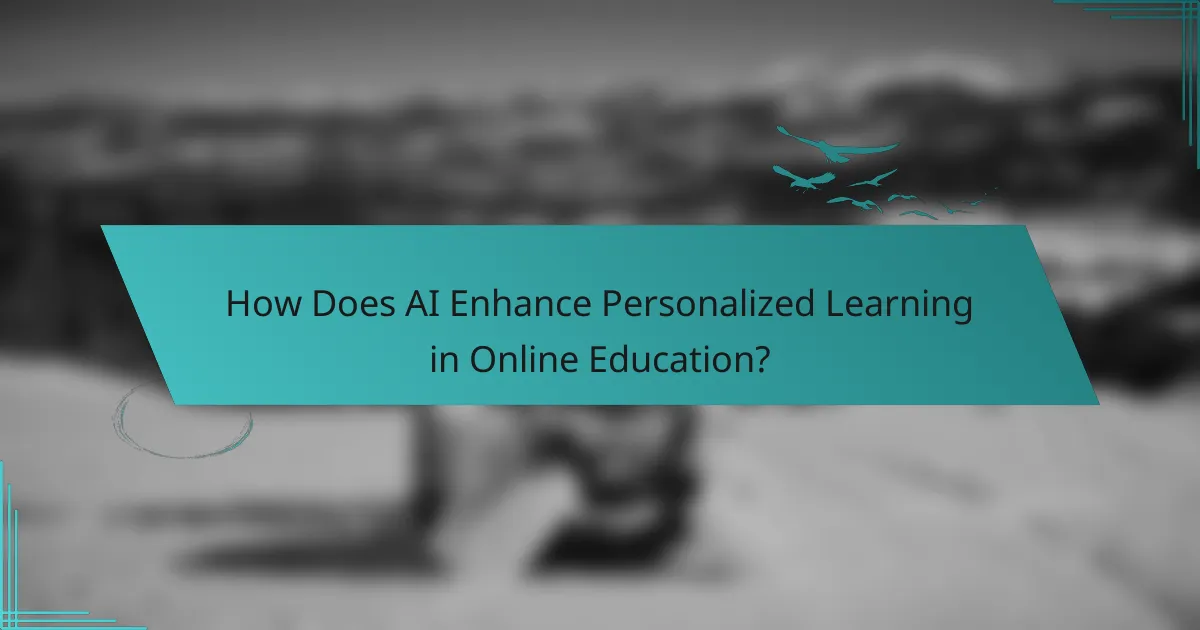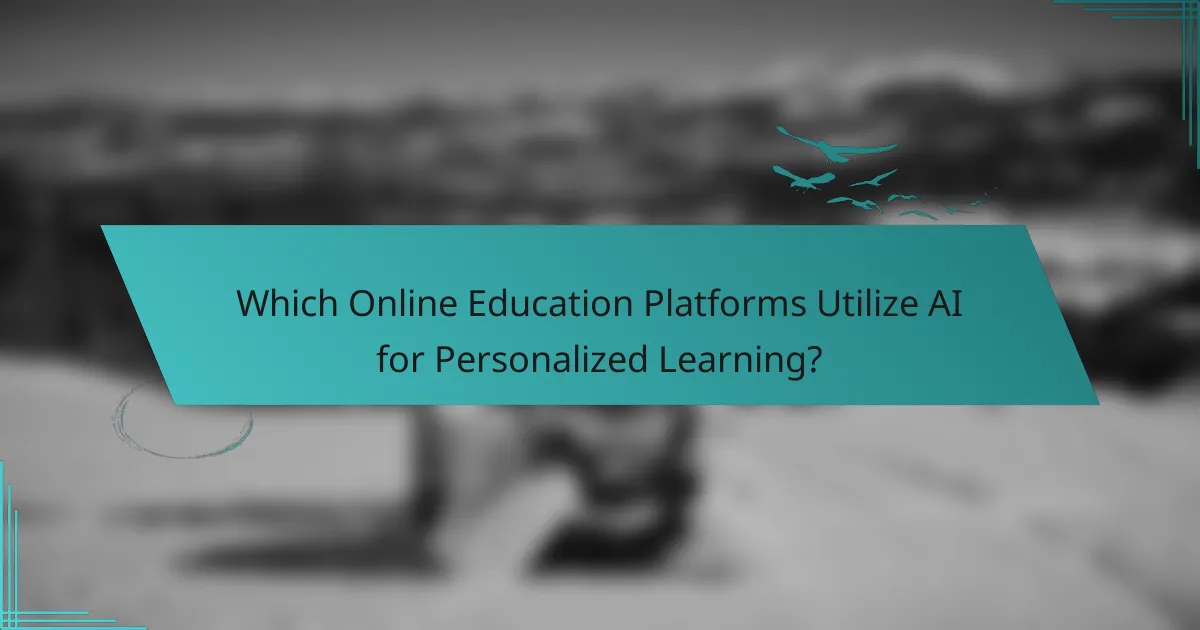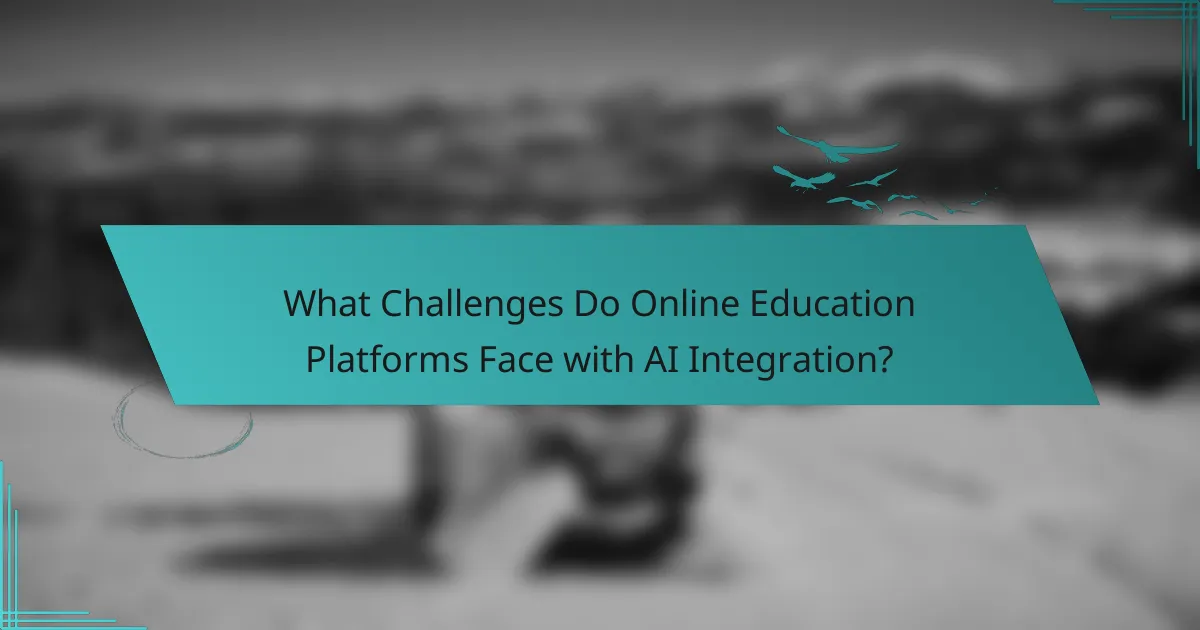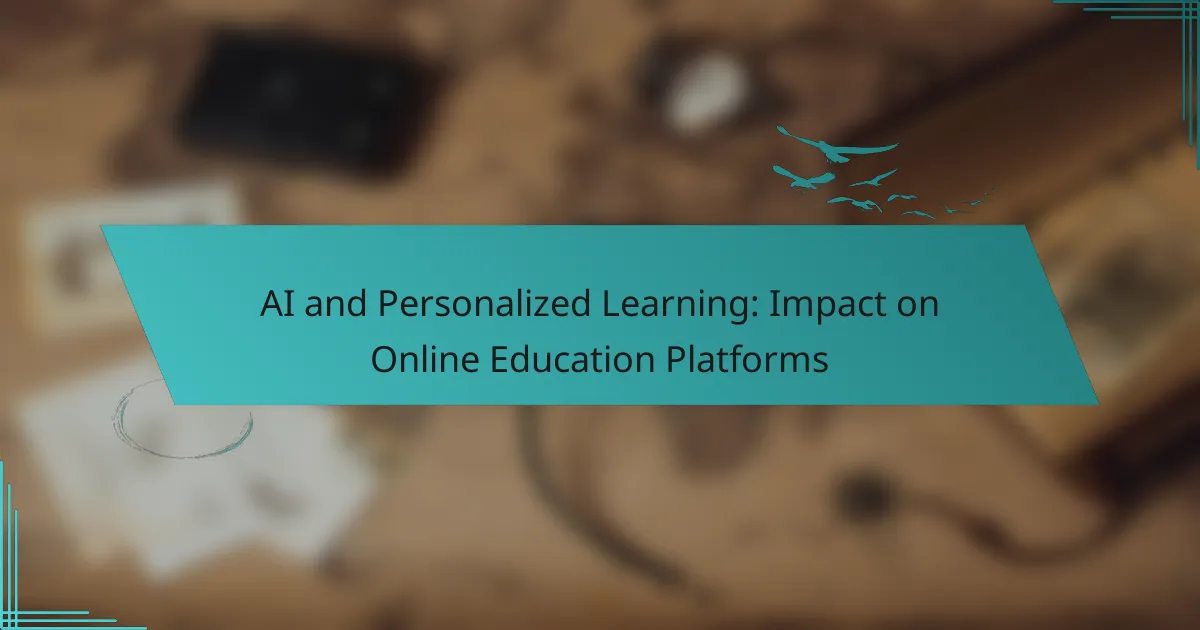Artificial intelligence is revolutionizing online education by enabling personalized learning experiences that cater to the unique needs and preferences of each student. By utilizing advanced algorithms, online education platforms can tailor content, track progress, and adapt learning paths, resulting in improved engagement and better educational outcomes. This innovative approach not only enhances the learning experience but also increases retention rates, making education more effective and accessible.

How Does AI Enhance Personalized Learning in Online Education?
AI enhances personalized learning in online education by tailoring educational experiences to individual student needs, preferences, and learning paces. This customization leads to improved engagement and better learning outcomes through targeted content and adaptive strategies.
Adaptive learning algorithms
Adaptive learning algorithms adjust the difficulty and type of content based on a learner’s performance in real-time. For instance, if a student struggles with a particular math concept, the system may provide additional practice problems or alternative explanations until mastery is achieved.
These algorithms often utilize machine learning techniques to analyze student interactions and predict future learning paths. This ensures that each learner receives a unique educational experience that evolves as they progress.
Data-driven insights for customization
Data-driven insights allow educators to understand student behaviors and preferences, enabling more effective customization of learning materials. By analyzing data from quizzes, assignments, and engagement metrics, platforms can identify areas where students excel or need support.
This information can inform curriculum adjustments, ensuring that content remains relevant and engaging. For example, if a significant number of students find a topic challenging, educators can modify the approach or provide supplementary resources.
Real-time feedback mechanisms
Real-time feedback mechanisms provide immediate responses to student actions, enhancing the learning process. For example, when a student submits an answer, they receive instant feedback on correctness, which helps reinforce learning and correct misunderstandings promptly.
This immediate interaction fosters a more engaging learning environment, as students can quickly adjust their strategies based on the feedback received, promoting a growth mindset.
Content recommendation systems
Content recommendation systems suggest resources tailored to individual learning styles and needs. By analyzing past interactions and preferences, these systems can recommend videos, articles, or exercises that align with a student’s interests and current skill level.
This personalized approach not only keeps learners engaged but also encourages exploration of related topics, facilitating a deeper understanding of the subject matter.
Learning analytics for progress tracking
Learning analytics provide insights into student progress and performance over time, allowing both learners and educators to track development. By visualizing data such as completion rates and assessment scores, students can identify strengths and weaknesses in their learning journey.
Educators can use this information to intervene when necessary, offering additional support or resources to ensure that all students stay on track. Regularly reviewing these analytics can help in adjusting teaching strategies and improving overall course effectiveness.

What Are the Key Benefits of AI in Online Education Platforms?
AI enhances online education platforms by providing personalized learning experiences, improving engagement, and increasing retention rates. These benefits lead to more effective learning environments that cater to individual student needs.
Improved student engagement
AI-driven tools can analyze student behavior and preferences, allowing platforms to create interactive and engaging content. For example, gamification elements and adaptive quizzes can keep learners motivated and invested in their studies. This tailored approach encourages students to participate actively rather than passively consume information.
Additionally, AI can facilitate real-time feedback, helping students understand their progress and areas for improvement. This immediate response fosters a sense of connection and accountability, further enhancing engagement levels.
Increased retention rates
Personalized learning experiences powered by AI can significantly boost student retention rates. By identifying at-risk students through data analysis, platforms can intervene early with targeted support and resources. This proactive approach helps prevent dropouts and keeps learners on track.
Moreover, AI can recommend relevant courses or materials based on individual learning paths, ensuring that students remain interested and challenged. This continuous alignment with their goals helps maintain their commitment to the educational journey.
Tailored learning experiences
AI enables the customization of learning experiences to fit each student’s unique needs and preferences. By assessing learning styles and pacing, platforms can deliver content that resonates with individual learners, whether they prefer visual aids, interactive simulations, or traditional reading materials.
For instance, an AI system might suggest supplementary resources or modify the difficulty of assignments based on a student’s performance. This level of personalization not only enhances understanding but also promotes a sense of ownership over one’s learning process.
Scalable educational solutions
AI technology allows online education platforms to scale their offerings efficiently. With automated grading systems and personalized content delivery, educators can manage larger groups of students without compromising the quality of instruction. This scalability is particularly beneficial in regions with limited access to qualified teachers.
Furthermore, AI can facilitate the creation of extensive libraries of learning materials that can be easily updated and expanded. This ensures that educational resources remain current and relevant, catering to diverse learner populations across various locations.

Which Online Education Platforms Utilize AI for Personalized Learning?
Several online education platforms leverage artificial intelligence (AI) to enhance personalized learning experiences. These platforms utilize algorithms to tailor content, track progress, and adapt learning paths based on individual student needs.
Khan Academy
Khan Academy employs AI to provide personalized learning experiences through its adaptive learning technology. The platform assesses student performance and adjusts the difficulty of exercises accordingly, ensuring that learners are challenged at the right level.
Students can receive instant feedback and recommendations for additional resources based on their progress. This approach helps to keep learners engaged and motivated as they work through subjects at their own pace.
Coursera
Coursera integrates AI to offer personalized course recommendations and learning pathways. By analyzing user behavior and preferences, the platform suggests courses that align with individual career goals and interests.
Additionally, Coursera’s AI-driven assessments help identify areas where students may struggle, allowing for targeted interventions and resources to improve understanding. This tailored approach enhances the overall learning experience and increases course completion rates.
edX
edX utilizes AI to create personalized learning experiences through its dynamic content delivery system. The platform adapts course materials based on learner performance, ensuring that students receive the right level of challenge and support.
Moreover, edX’s AI tools analyze engagement metrics to provide insights into student progress, helping educators refine their teaching strategies. This data-driven approach fosters a more effective learning environment for diverse student populations.
Duolingo
Duolingo employs AI to personalize language learning through its adaptive learning algorithms. The platform tailors lessons based on user performance, ensuring that learners focus on areas where they need improvement.
Duolingo’s gamified approach, combined with AI-driven feedback, keeps users motivated and engaged. The platform also adjusts the frequency of vocabulary practice based on individual retention rates, optimizing the learning process for each user.

What Challenges Do Online Education Platforms Face with AI Integration?
Online education platforms encounter several challenges when integrating AI, including data privacy concerns and implementation costs. These issues can significantly impact the effectiveness and adoption of AI technologies in educational settings.
Data privacy concerns
Data privacy is a major challenge for online education platforms using AI, as they often collect sensitive information from students. Ensuring compliance with regulations like GDPR in Europe or FERPA in the U.S. is crucial to protect personal data and maintain user trust.
Platforms must implement robust data protection measures, such as encryption and anonymization, to safeguard student information. Failure to address these concerns can lead to legal repercussions and damage to the platform’s reputation.
Implementation costs
The costs associated with implementing AI technologies can be substantial for online education platforms. Initial investments may include software development, infrastructure upgrades, and ongoing maintenance, which can range from thousands to millions of dollars depending on the scale of integration.
Platforms should carefully assess their budget and consider phased implementation strategies to spread costs over time. Additionally, exploring partnerships or grants can help mitigate financial burdens while enhancing AI capabilities.
